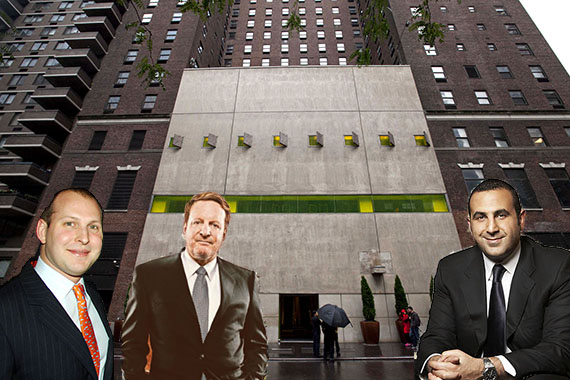After seeing merger negotiations with Morgans Hotel Group crumble last fall, hotelier Sam Nazarian wasn’t taking any chances this time around.
When Nazarian’s firm SBE Entertainment Group took another shot at buying out the boutique hotel management company, it pressed Morgans’ major shareholders to sign a voting agreement that bound them to the key terms of the transaction and ensured SBE would not be left at the altar again.
The voting agreements were “a key part of the deal” between the two sides, sources involved in the transaction said. Los Angeles-based SBE [TRData] will pay $2.25 for each common share of publicly traded Morgans’ stock – between $82 million and $85 million in equity. Factoring in debt and investor Ron Burkle’s preferred stake in the company, the transaction pegs Morgans at a total enterprise value of $794 million.
But the sale wouldn’t have happened without an assurance from the key players on Morgans’ side – largest shareholder OTK Associaties, led by investors Jason Kalisman and Michael Olshan, as well as Morgans chair Howard Lorber, Burkle’s Yucaipa Cos. and asset manager Pine River Capital Management – that they could put aside their differences and guarantee they would vote for the deal.
Those differences – notably a long-standing feud between Burkle and former Morgans CEO Kalisman – were a key reason talks with SBE fell apart last fall. That deal would have merged Morgans with Nazarian’s empire, bringing both companies under the same publicly traded umbrella. Nazarian would have led the new entity, while Burkle would have assumed ownership of the last two hotels actually owned by Morgans – the Hudson New York in Midtown and the Delano South Beach in Miami – in exchange for relinquishing his $75 million preferred equity stake in the company.
But OTK felt those terms far too skewed in Burkle’s favor, insiders said, and persuaded Pine River to oppose the transaction. While SBE didn’t rule out a return to the negotiating table in the future, it was clear something would have to give on Morgans’ side. When the merger talks fell apart in November, Morgans’ stock plummeted, hitting a low of $0.79 per share in February.
The new deal, announced May 9, is substantially different: SBE is now buying Morgans outright, instead of merging with the company; will assume ownership of the Hudson New York and the Delano South Beach; and will manage 11 other hotels in New York, Miami, Los Angeles, San Francisco, Las Vegas, London and Istanbul. Burkle, meanwhile, will get a 25 percent common equity interest in SBE, while the rest of Morgans’ shareholders will be bought out.
A week before the new deal, Morgan’s stock was trading at $1.32 per share. On Tuesday, it opened trading at $2.14 per share.
The two companies re-engaged in talks earlier this year, sources said, after Morgans’ board tapped Hodges Ward Elliott to sell the Hudson New York and the Delano South Beach.
“If a deal was going to come together, [SBE wanted an] assurance that this [infighting] was not going to go on and on,” said one source involved in the deal, who spoke on condition of anonymity. “[The voting agreements were] predicated on, ‘Here’s the contract of a deal that makes sense, [and] you guys at Morgans saying you’re on board is not enough.”
In an interesting twist, SBE will also obtain part of its financing for the acquisition from the sale of a new preferred equity stake in the company to a third-party investor: Jonathan Goldstein’s Cain Hoy Enterprises.
The preferred equity investment, which SBE said gives it “more flexibility to pursue growth opportunities,” brings to mind Burkle’s preferred equity stake in Morgans, which recapitalized the company at the cost of providing the billionaire investor with consent rights over the company and its direction.
But Goldstein’s preferred equity stake in SBE does not provide such consent rights, sources said, meaning it is unlikely SBE will be burdened by the sort of boardroom bickering that had thrown Morgans – which had been without a CEO since Kalisman’s resignation in May 2015 – into disarray.
Representatives for SBE and Morgans did not respond to requests for comment.
The transaction, expected to close later this year, will give SBE a total of 20 hotels holding more than 6,000 keys in nine markets worldwide. The company appears to be in growth mode, with plans to open an additional five hotels — including Morgans’ planned Mondrian Doha in Qatar — by the end of 2016.
With Nazarian now leading the show, there is hope among observers that Morgans, a company that helped popularize the boutique hotel sector under the leadership of its founders Ian Schrager and Steve Rubell, can be restored to its past glory – albeit under the SBE name.
“I think the hotels are back in the right hands,” said Sahm Adrangi, the founder and CIO of private investment firm Kerrisdale Capital who, alongside Burkle, lodged a proxy fight for control of Morgans’ board in 2014. “I think the company will benefit from being operated by a more competent team.”




